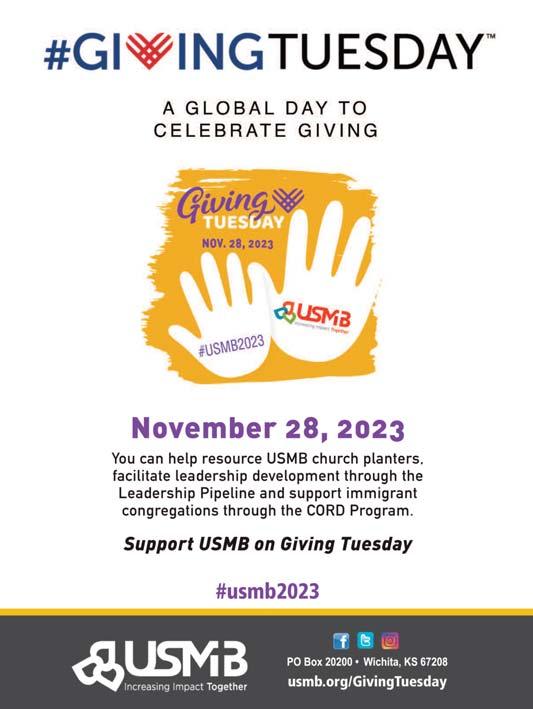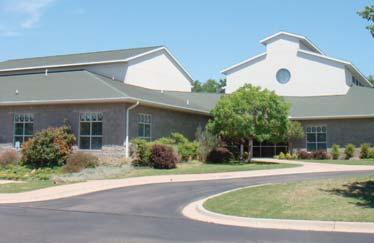












“Who is included in the ‘great cloud of witnesses’ watching you and I run our race of faith?...
It’s a huge crowd, numbering thousands...
But it’s also a personal cloud comprised of people here in the United States and around the world who are rooted in our Mennonite Brethren family tree.”
Who is watching us run our race of faith?
Thisissue celebrates the faith of those who have gone before us. The opening feature article looks at Hebrews 11, which says in verses 1-2, “What then is faith? It is what gives assurance to our hopes; it is what gives us conviction about things we can’t see. It is what the men and women of old were famous for” (KNT).
The profiles following the opening article highlight Anabaptists and Mennonite Brethren who are famous for their faith—men and women whose courage and wisdom can inspire and encourage us. Thanks to the MB Historical Commission for permission to reprint four Profiles in Mennonite Faith as part of this collection of biographies. Full versions of these profiles are on the MB Historical Commission website (https://mbhistory.org/profiles/). Profiles in Mennonite Faith is a series of biographies about Anabaptists and Mennonites who, in various ways, exemplify Christian faithfulness. The biographies are published semiannually and distributed free of charge to MB congregations.
Reading through the list of heroes in Hebrews 11 provides a helpful context to the familiar words of Hebrews 12:1: “Therefore, since we are surrounded by such a great cloud of witnesses, let us throw off everything that hinders and the sin that so easily entangles. And let us run with perseverance the race marked out for us.”
I have one experience running a race in front of a crowd. It was a predict race during Tabor College homecoming and I came away with a prize. Winners were the runners who finished the race in the time they predicted, so I didn’t have to be fast to win. I just needed to stick with my pace. The race concluded with participants running into the football stadium and across the finish line, and what fun it was to hear family, friends and even strangers cheering us on.
Who is included in the “great cloud of witnesses” watching you and I run our race of faith? I think of this cloud as all followers of Jesus beginning with those we read about in the Old Testament and continuing through all of history. It’s a huge crowd, numbering thousands.
But it’s also a personal cloud comprised of people here in the United States and around the world who are rooted in our Mennonite Brethren family tree. Men and women who lived out their belief and faith in our God, including the men and women featured in this issue and the 70 others highlighted in Profiles in Mennonite Faith.
Our cloud of witnesses is also comprised of people in our own families, as the BodyLife stories about the Kliewer sisters (pp 20-21) and the Schultz family (pp 22-23) demonstrate. It’s parents and grandparents and previous generations shouting their encouragement from the stands, urging us to devote ourselves to running our race with perseverance, free of the sins that hold us back. As you read the articles in this issue, I invite you to reflect on the people who have shaped your faith story and to give thanks for their example.
Connie Faber, Editor

Publisher: United States Conference of Mennonite Brethren Churches/ISSN 0009-5149
Editorial Committee: Matt Ehresman, Michele Fiester, Aaron Garza, Ryan Loewen, Shelly Spencer, Tony Petersen. Review Committee: Don Morris, Jordan Ringhofer, Brent Warkentin, Daniel Rodriguez
Disclaimer: The content and viewpoints expressed do not necessarily reflect the views, beliefs and/or viewpoints of USMB as a whole.
Copyright: Articles are owned by the Christian Leader or the author and may not be reprinted without permission. Unless noted, Scripture quotations are from the New International Version.
Postmaster: Send address changes to Christian Leader, Box 155, Hillsboro, KS 67063. Periodical postage paid at Hillsboro, KS Vol. 86, No. 6 — November/December 2023
Subscriptions: $10 for six issues and $20 for 12 issues ($15, $30 in Canada, all other countries $25 for six issues); $2 per copy.
Correspondence: Christian Leader, Box 155, 107 N. Main, Hillsboro, KS 67063-0155. Phone: 620.947.5543. Email: editor@usmb.org
Membership: Evangelical Press Association and Meetinghouse
■ Don Morris, EDITOR-IN-CHIEF
■ Connie Faber, EDITOR
■ Janae Rempel, ASSOCIATE EDITOR
■ Shelley Plett, GRAPHIC DESIGNER
Dirk Willems
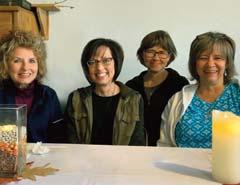

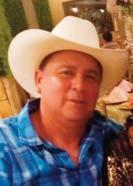

Peter Martinovich Friesen
Heinrich and Maria Enns
John B. Toews Church statesman
P. Karuna Shree Joel
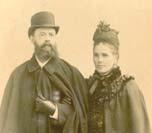

Aswe continue to explore the crucial need for developing more ministry leaders, I am calling for a vision summit to be held in early January 2024 in Phoenix, Ariz. The plan is to gather leaders by invitation only to discuss options for how we can do a better job of developing leaders and then to come up with an action plan moving forward.
I hope to have at least 40 leaders present—MB leaders who currently have a part in leadership development and some pastors who have a passion for seeing more men and women placed in the leadership pipeline.
Although the leadership development deficit we experience as Mennonite Brethren is also experienced by nearly every denomination in the United States, we can do better. In fact, if we are to have a future we must do better. The days of a plethora of men and women choosing ministry as a vocation are gone. We must actively encourage young people to consider using their God-given gifts for pastoring, church planting, missionary work, evangelism, youth ministry, worship leading and teaching.
“...we can do better. In fact, if we are to have a future we must do better.”
I’ve received some communication from people indicating that our problems would be solved if we would simply allow women to be lead pastors. Regardless of one’s view on women in pastoral ministry, if this were true then denominations who do have women in lead pastoral roles wouldn’t also have a leadership void. But they do. So, it’s not about our collective policy of not allowing women in the lead pastor role. The problem is much more complex than that.
Young leaders are choosing the secular marketplace rather than church ministry for a lot of reasons. One, it’s more rewarding financially. Let’s face it—most churches don’t pay anywhere near the salaries and benefits found in the marketplace. In addition, various sources reveal that many parents prefer their children choose jobs that pay better than typical ministry positions. Thus, they discourage ministry as a vocation for their children. Two, young leaders see and hear how hard ministry life is. Many have personally observed intense church conflict. They’ve witnessed pastors being around for three or four years and then—gone.
The March 2017 Barna Group study “The Aging of America’s Pastors” reveals some alarming statistics. David Kinnaman, Barna Group president, says: “There are now more full-time pastors over the age of 65 than under the age of 40. It is urgent that denominations, networks and independent churches determine how to best motivate, mobilize, resource and deploy more younger pastors.” This is a startling revelation.
But let’s shift gears. Jesus says, “The harvest is plentiful, the workers are few” (Luke 10:2). This isn’t just a 2023 problem. It’s an age-old problem.
But Jesus also adds, “Ask the Lord of the harvest, therefore, to send out workers into his harvest field.” Developing and sending out more leaders isn’t just our problem—God wants to be involved! He wants us to ask him for workers. These are his workers, called by him. He’s the One who has gifted people for works of service. The work being called to is his kingdom work, not our work.
Therefore, although a vision summit—getting leaders together to think and dream—is a good thing, prayer is THE thing. Prayer will be a key element at the vision summit. We need to get on our knees and ask God about his harvest workers. How do we help get them involved? How do we develop them? How do we deploy them? I think God has the answer if we’ll listen.
Don Morris don@usmb.org

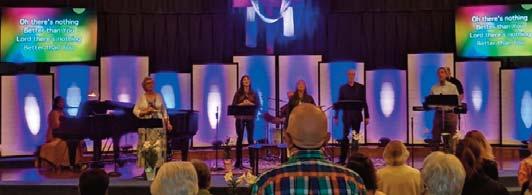



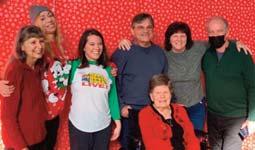
Established: 1940 Pacific District Conference Attendance: 70
Lead Pastor: Tyler Cole Our congregation in three words: Jesus, Loving, Community How
Pray as we continue to seek ways to show the love of Jesus to the incredibly unchurched Silicon Valley.
Top of page: The focus of Easter weekend at LGC is outreach. The Easter worship service is one of their bigger outreach opportunities of the year. The Community Egg Hunt, in partnership with a church that rents space on the LGC campus, is an event for growing relationships with neighbors and serving the community.
Left, top: In partnership with a local Christian school, LGC hosted a lunch for local pastors. Valley Christian Schools says 80 percent of the families at the school do not attend any church, and they are working with local churches to reach these families.
Left, middle: At Kid’s Camp this summer, LGC invited kids from the community to come and hear about Jesus’ love for them.
Left, bottom: While the Christmas Day service was very casual, it was one of the most meaningful services of the year.
Compiled by Janae Rempel
More than 160 pastors, delegates, ministry partners and guests gathered Sept. 15-17 at The Life Center in Lenoir, N.C., for the 2023 Eastern District Conference biennial convention.
Four churches were received into district membership: Peniel International Ethiopian Evangelical Church in Clarkston, Ga.; Global Ethiopian Gospel Believers Church in Stone Mountain, Ga.; Branches Outreach Mission in Providence, Ky.; and Restoration Church in West Chester, Ohio.
In other business, delegates gave reports, heard about an upcoming revision to the EDC constitution and bylaws, affirmed officers and representatives, heard a budget report and brief introductions from agencies, partners and workshop presenters and attended workshops. District minister Terry Hunt announced his intention to retire, effective Sept. 30.
Two speakers, USMB national director Don Morris and The Urban Ministry Institute founder Don L. Davis, highlighted the convention.
Musicians from The Life Center and Christian Center the Hand of God in Hamilton, Ohio, led in singing. The convention closed with communion.—CL

District Minister Terry Hunt (far right) and pastor Mike Mathes (second from right) presented representatives of the four churches joining the district with commemorative plaques during Sunday’s service: (from left) Alemu Chemeda of Peniel International Ethiopian Evangelical Church in Clarkston, Ga.; Solomon Desta of Global Ethiopian Gospel Believers Church in Stone Mountain, Ga.; Robert Townsend of Branches Outreach Mission in Providence, Ky.; and Jules Mukaba of Restoration Church in West Chester, Ohio. Photo: Janae Rempel
The Christian Leader received a fourthplace award in the Evangelical Press Association 2023 Best in Class contest. The magazine was judged in the 5,501 to 9,000 circulation category.
“Informative and challenging content,” wrote one judge. “Keep up the good work.”
In the Best in Class contest, EPA publications are grouped by circulation and enter one issue of their publication to be judged in six areas, including design, use and quality of images, strength of writing and titling and “overall editorial punch.” For most magazines, contestants compete against a different group of magazines than in the Awards of Excellence contest where competition is divided by type of magazine.
“This spring the CL received an Award of Merit in the Awards of Excellence—Denominational category,” says editor Connie Faber. “This award recognized the quality of our publication when judged alongside denominational magazines. To be recognized for the fourth year in Best of Class among our distribution category again affirms the work of our designer, writers and editors. I so appreciate all who contribute to our magazine.”
Christian Leader has received an award in the Best in Class contest every year since it was introduced in 2020. Last year the magazine received first place as well as third place in 2021 and fourth place in 2020..—CL
Recent research within the USMB network has found a shortage of young people pursuing vocational ministry opportunities. This leadership gap could have significant future implications, so leaders are investigating the potential causes and what churches can do to help prepare the next generation of leaders.
As part of this effort, USMB is hosting a webinar addressing the current leadership development landscape on Tuesday, Dec. 5, at 10:30 a.m. CST. The webinar will double as a live LEAD Pods recording as host Matt Ehresman has a conversation with Wendell Loewen, Tabor College professor of youth, church and culture; Kyle Goings, USMB NextGen chair; and Joanna Chapa, Multiply regional mobilizer.
Register for the webinar at https://usmb.org/event/webinar-developing-young-leaders/.—USMB
Individuals and churches will have opportunity to support USMB on Giving Tuesday, Nov. 28, 2023. Giving Tuesday is a global day dedicated to generosity that falls on the first Tuesday after Thanksgiving.
Donated funds will be used to support USMB mission and ministry, including the Church Planting Council, Leadership Pipeline and CORD Program.
“Every dollar given on Giving Tuesday helps USMB to provide many different resources for our MB pastors and churches,” says USMB national director Don Morris. “Your gifts can help us better resource our MB church planters, assist with church internships through the Leadership Pipeline and provide connecting points for immigrant churches through our supportive CORD program.”
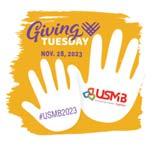
In the nine years USMB has been part of Giving Tuesday, donors have contributed more than $245,000, including $10,775 last year.
“Thank you for giving to USMB on Giving Tuesday,” Morris says. “We will wisely use all donations for mission and ministry, not for overhead.”
For more information, visit www.usmb.org/GivingTuesday. Donors may use the hashtag #USMB2023.
The Giving Tuesday movement raised $3.1 billion in donations in the U.S. last year.—USMB
ASCENT, USMB NextGen’s annual national summer camp for Mennonite Brethren youth, has moved locations and will be held at Camp Walk On Water (WOW) in Stuart, Okla., June 8-12, 2024.
According to NextGen chair Kyle Goings, one of the primary reasons for the location change was the limited housing and meeting spaces at Glorieta Adventure Camps in Glorieta, N.M., where camp has been held since 2019.
Camp WOW features lodging with more than 700 beds, versatile meeting spaces, a party barn and snack shack, and all buildings have air conditioning. Recreational activities include ziplining, water tubing and rock climbing.
Another benefit is cost effectiveness. Student and adult registration costs will be lower in 2024, Goings says.
“We are excited about the fresh opportunities that Camp WOW presents,” Goings says. “We believe that the change of scenery will breathe new life into our summer camp experience.”
Read more at www.usmbnextgen.com/new-location-for-ascent2024/.—USMB NextGen

More than 40 second generation immigrants and USMB church leaders gathered Aug. 25-27 near Cincinnati, Ohio, for a Mennonite Central Committee (MCC) Peace Camp. Congolese youth and pastors from three USMB churches in Ohio attended: Christian Center the Hand of God in Hamilton; Royal Family International Church in Fairfield; and Restoration Church in West Chester.
The camp brought together staff from MCC and USMB’s Integrated Immigrant Ministries (IIM).
“We focused on biblical principles of peacemaking, overcoming trauma and the importance of learning the new culture without losing our backgrounds,” says IIM coordinator Henri Ngolo. “This is the first of many events to come.”
According to MCC U.S. peace education coordinator Jes Stoltzfus Buller, the camp provided a handson learning experience, offering tools to aid intercultural competence, peacemaking, conflict resolution, trauma healing and resilience.—CL
| Read longer versions of these and other articles at christianleadermag.com |
Make plans to join the U.S. Mennonite Brethren family in Omaha, Neb., next summer for USMB Gathering 2024, the biennial National Pastors’ Conference and National Convention, July 23-27, 2024.
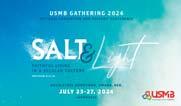
The planning committee has selected “Salt and Light: Faithful Living in a Secular Culture,” as the theme, with a focus on living unreservedly in the way of Jesus.
Gathering 2024 will feature speakers Gary Hoag and Brian Kluth, sponsored by MB Foundation, and Natasha Crain, Don Morris and the new USMB national director.
Plan now to attend USMB Gathering 2024, where you will be encouraged, challenged and resourced by dynamic speakers, experience community and support our national MB family. More information is available at www.usmb.org/usmb-gathering-2024.—USMB
Tabor College in Hillsboro, Kan., saw a 5 percent increase in its fall-to-fall undergraduate enrollment, with 531 students on campus in Fall 2023. With 83 students in graduate and online courses and 50 in dual credit, the college has 664 students enrolled this fall.
“Enrollment is right on budget, and strong retention is proof of what we have been experiencing on campus, that students are thriving at Tabor College,” says President David Janzen.
The college retained 84 percent of its students from January to September 2023 and 78 percent from the previous fall semester. The fall-to-fall retention percentage is the best in the last decade.—TC
Fresno Pacific University in Fresno, Calif., reports an increase in traditional undergraduate students for 2023-24.
“This significant enrollment increase marks the end of a 10-year decline in traditional undergraduate enrollment—a milestone to celebrate,” says Brad Camilleri, vice president of enrollment management.
Traditional undergraduate (TUG) enrollment is up 10 percent for a total of 827 in 2023, and the number of graduate students is up 1 percent to 1,305, of whom 110 are enrolled at Fresno Pacific Biblical Seminary.
Degree completion student enrollment decreased 21 percent to 787 students. Overall enrollment for the fall of 2023-24 is 2,919, 4 percent below the same time in 2022-23, when total enrollment was 3,029.—FPU
5 minutes with...
Parked at the curb just kitty-corner from Axiom Church in Old Town Peoria, Ariz., you’ll find Pearly’s Diner, a new food truck serving up breakfast and lunch six days a week. The food truck is the creation of Axiom member Frank Foley, a professional chef trained at Johnson and Wales University Culinary School. While shredding potatoes for tomorrow’s latke, Frank reflected on his vision for Pearly’s Diner and Old Town Peoria.
Why did you decide your food truck would be a diner?
My first job as a cook was in a diner so I have a deep and abiding love for the lowly diner. Diners are not about the name of the chef or how “Instagrammable” your food looks. Diners are incredible community facilitators about getting the same people to come around week after week. When I thought about the restaurant I could do for the rest of my life, it was a diner.
How did you choose your location?
Axiom opened a playground to help restore this Old Town neighborhood. I spent a lot of time on that corner becoming aware of the needs of the community. People would bring their kids to play, but there was nothing to eat. The city’s green space across the street was a perfect place for guerrilla-style dining where you pull up the trailer and serve some simple food. We want more people to come down and stay and come back to get inspired the way we have.
How can you operate a food truck in summer in Arizona?
With my two-ton air conditioning it can be 115 outside and just 85 in the truck. As far as

professional kitchens go, that’s pretty cool. I’ve worked in kitchens where the thermometer in my jacket shows 140 degrees.
What is your workday like?
I’m usually up at 4, spend a half hour centering myself and then head to the gym to get the blood pumping, ready to face the inevitable problems that will need to be solved. I’m in the truck by 6. We serve breakfast and lunch from 8am till the generator runs out of gas about 2 p.m. It’s 4 or 5 p.m. by the time we do all the clean down and prep for the next day.
What do chefs know that the church could learn from?
The term mise en place is big in chef culture. It refers to everything in its place and becomes a real lifestyle—make sure your prep is done and utensils are in place so when the work gets tough things are where they are supposed to be. The mise en place as Christians is putting Christ in front of everything else—to put my life in order whether in giving or serving. When Pearly’s tithes she does it at the beginning of the month. If you prioritize serving it’s easier to do and helps you to be true to what you commit to.
Interview by Kathy Heinrichs Wiest

Last year, BK, a Khmu Mission Conference leader, took a small team across the border from the country where they live to another restricted area. The purpose of this trip was to explore and discern opportunities to preach and teach in that region. On this trip they met a few believers and pastors and have been connecting with them to build relationships. They plan to provide these churches with discipleship and leadership training to see the gospel penetrate this restricted region.
The Khmu church leaders are filled with compassion for those around them, especially in places where people are suffering because of poverty. The government does little to assist the poorer villages, especially the ones where some families have become followers of Jesus. With the partnership of agencies like Multiply and others, the churches are providing practical assistance like clean water and sanitation projects and helping the local schools have the resources to provide local children with an education.
One example is the building of new classrooms in very poor villages that have neglected and broken-down schools. These practical expressions of love and generosity have resulted in opportunities to share the gospel, and people are turning from their fear of the spirits to follow Jesus. But this change can often result in opposition or persecution.
The Khmu Mission Conference was born amid opposition and persecution, resulting in a strong church ready to face many challenges for God’s glory. Over the last 20-plus years, the conference has grown and today there are more than 160 churches and 12,000-plus members.
• The word Khmu means “real people” or “human being.”
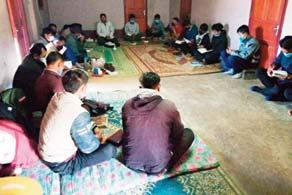
Many more house churches and new churches are being planted. The conference is led by a team of leaders, including BK, from several provinces while teams of leaders are being trained to give leadership to regional clusters and networks of churches.
PRAYER REQUESTS:
• Pray for Khmu conference leaders as they plan to reach out to many villages in their own country and bordering countries to make new disciples, plant new churches and train new leaders. They have a vision to reach other indigenous people groups with the good news of Jesus.
• Pray that leaders will have courage, power and wisdom (Acts 4) as they often face opposition from local spiritual and government leaders.
• Pray for the new believers to stand strong and for those opposing them to have their hearts changed by the grace of God.
• The Khmu are an ethnic group of Southeast Asia, living on mountain slopes and in upland valleys.
• Khmu people are skilled in the use of bamboo, using it for baskets, musical instruments, water containers or houses.
By Tony Petersen
What makes someone a hero? In Greek mythology, heroes have a tragic element to them—their heroic qualities are the very source of their downfall. In our modern mythos, we have comic book heroes, super men and women who may face obstacles and challenges but always rise above them to vanquish the enemy—at least until the sequel. We call “heroic” those who save others from burning buildings and those who accomplish a particularly daunting athletic feat.
Based on the way we use the word, it doesn’t seem all that clear if the word “hero” has any meaning at all. Is a hero one with superpowers who can achieve extraordinary things? Does a hero have extremely normal powers yet responds admirably to extraordinary situations? Is a hero someone who pushes his or her body to its very limits to grasp extraordinary achievements?
This matters because we desire to emulate what we deem heroic. And this becomes a problem when what we desire to emulate is unattainable. Superpowers are computer generated. Our bodies are constantly breaking down. Even

heroic acts performed by ordinary people require a sudden courage that our plastic culture does not cultivate. And even when it does, further scrutiny reveals many other shortcomings in our newfound heroes. What then?
Since our world is unable to give a satisfactory example of a hero, the Bible seems to be a good place to look next. In Hebrews 11, we find a compendium of heroes and their heroic acts. Looked at from one perspective, it is a hall of heroes every bit as grand as Valhalla: founders of nations, prophets, miracle workers, powerful warriors, kings and those who gave their lives, sometimes in gruesome ways, for a cause greater than themselves. We see honor and glory, strength and courage—we see heroism. From this superficial reading, we might say that to be a hero is to do what these heroes did.
Lurking beneath the surface, we find another, more sinister truth. In Hebrews 11 we also meet murderers, adulterers and abusers, those whose neglect of their children lead to their ruin and those whose pride lead many to idolatry.
Jephthah’s rash and terrible vow, combined with his igno-

rance of the law, causes him to sacrifice his own daughter (Judges 11). Samson’s life is a chronicle of his own pride and arrogance leaving death and destruction in his wake, both of his enemies and of his own people (Judges 13-16). Should we really emulate these heroes? What is it that makes them heroes anyway?
Because of faith
Fortunately, this is only a cursory reading. According to the author of Hebrews, these people are not heroes because of their supposed heroic exploits that could be tarnished by their own folly. Rather, they are considered heroes because of their faith: “Now faith is confidence in what we hope for and assurance about what we do not see. This is what the ancients were commended for” (Hebrews 11:1-2, emphasis added).
This faith does not simply refer to sheer optimism, some vain hope that everything will work out. It is faith in God, in the personal Lord of Israel who, though he cannot be seen, fights for his people. They are heroes, not because of their own acts, but because of their faith in the God who will act for them according to his word. As Bible scholar F. F. Bruce puts it, “Their faith consisted simply in taking God at his word and directing their lives accordingly.”
Now we are getting somewhere. According to the biblical account, a hero is not simply someone who accomplishes some heroic deed, which may or may not be repeatable, and which, either way, is tainted by sinful shortcomings. A hero is someone whose faith is in God, whose deeds are done for his sake. But this only raises another question: What is faith? Or, since the author of Hebrews gives us a kind of definition, perhaps a better question is, what does this kind of heroic faith look like in action?
In Mark 9, a man brings his son to Jesus. This son is possessed by an evil spirit that leads him to foam at the mouth, gnash his teeth and convulse his body. The father is desperate. He even asks the disciples to rid his son of this spirit, though they are unable to. And so, in his desperation, he comes to Jesus.
“If you can do anything,” the father asks, “take pity on us and help us.”
What comes next gives us a key insight into what faith is. Jesus tells this father that if he believes—if he has true faith—anything can happen, even the deliverance of his son.
And this is how the father responds: “I believe; help my unbelief” (Mark 9:22-24, ESV).
This does not appear to be very heroic behavior. What does Jesus do? Does he walk away and say, “That’s not good enough”? Does he bemoan this fa-
ther’s faithlessness? No! In response to the father, he rebukes the spirit in the boy, commands it to come out, and it does.
This is extraordinary. Jesus says the way for this boy to be delivered is through faith. The father admits to a shaky faith, filled with doubt and unbelief. And then Jesus delivers. Faith, Jesus shows us, is not sheer certitude. Faith is belief and trust, whatever can be mustered, in the person of Jesus Christ.
This is part of the upside-down kingdom that is Christianity. A hero, the author of Hebrews tells us, is not defined by deeds but by faith. But in Mark 9, Jesus shows us that even a man with strong doubts and despair can have sufficient faith, if it is in God. Why can this be the case?
This is how the writer of Hebrews ends this section: “Therefore, since we are surrounded by such a great cloud of witnesses, let us throw off everything that hinders and the sin that so easily entangles. And let us run with perseverance the race marked out for us, fixing our eyes on Jesus, the pioneer and perfecter of faith. For the joy set before him he endured the cross, scorning its shame, and sat down at the right hand of the throne of God” (Hebrews 12:1-2).
The better hero
This is the key: Jesus is the pioneer and perfecter of faith. Jesus is the one who perfectly fulfills all that our heroes set out to do, even when they themselves are incapable of doing so. He is the true and better David, who overcomes his enemies not through worldly strength, but through weakness. Jesus is the true and better Jephthah, who honors God and saves his people, not by offering the body of someone else as the sacrifice, but by offering his own body as the death of sacrifice. Jesus is the true and better Samson who, through his death, saves his people not by exacting vengeance upon his enemies, but by exacting God’s vengeance on himself for his enemies.
The figures in Hebrews 11, the stirring examples from our Mennonite Brethren history in the pages that follow, the doubting father in Mark 9—and, perhaps, even you—can be lumped together because Jesus is the true and better hero for us. A real hero fixes his or her eyes on Jesus, the one who perfects our imperfect faith. And as we fix our eyes on Jesus, we too can run with perseverance the race marked out for us. Jesus, the true hero, will prepare us for our own acts of heroism.
Tony Petersen is a pastor at Mountain View East in Fresno, Calif, and adjunct history professor at Fresno State. He and his wife, Roxanna, have three daughters.
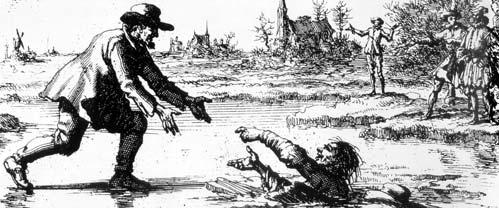
Dirk Willems (died 1569) raced for his life across the thinly frozen pond. Willems was an Anabaptist (a 16th century name for many Mennonites), and Anabaptists all over Europe were being tortured and put to death. If the guard caught him, it would be his life. So, he ran as fast as he could. Although weakened from his stay in prison, Willems was so light that he made it over the thin ice of the pond, known as the “Hondegat.” But his pursuer, stronger and heavier, did not make it across. The ice cracked, the guard fell in, and soon the cold water swirled above his head.
Without stopping to consider the consequences, Dirk reflexively turned back, reaching a helping hand toward the guard and slowly pulling him from the water to the safety of the pond’s edge. The guard had no choice but to take Dirk back to prison.
Some weeks went by as Dirk languished in prison. Eventually, the judge handed out the sentence: “Whereas Dirk Willems, born at Asperen, at present a prisoner, has . . . confessed, that at the age of 15 . . . he was rebaptized in Rotterdam, at the house of one Pieter Willems, and that he further, in Asperen, at his house, at diverse hours . . . permitted several persons to be rebaptized . . . therefore, we the aforesaid judges . . . do condemn the aforesaid Dirk Willems that he shall be executed with fire, until death ensues.”
Did rebaptism really make a person so threatening that execution was necessary? While such a sentence seems unlikely in our times, it was the fate of many 16th
century Anabaptists. In 1569, when Willems was executed, rebaptism signaled a belief that one no longer thought the existing church—the state church—was an authentic church. Rebaptism expressed the desire to become part of a counter-movement—a restored church— that would stand against the corruptions of both the church and the larger society. That kind of religious dissent from the practice of religious uniformity was so threatening that it had to be stamped out, even if that meant executing people like Dirk Willems.
The inhabitants of present-day Asperen have memorialized Willems’ remarkable act of charity by naming a city street in his honor. The spiritual descendants of Willems and other 16th century Anabaptist martyrs now number in the millions. For Mennonites, no other story out of the 16th century has so captured the imagination. What Willlems did on that icy pond was reflexive. He didn’t have to stop and think whether it was right or wrong or what the consequences would be. He simply did what his faith compelled him to do.
Willems’ spontaneous response to someone in need comes from a heart undivided. For 16th century Anabaptists, faith in Jesus the Christ meant following him in every detail of life. Many of them, like Dirk Willems, lived and died with such an undivided heart.
Paul Toews is a long-time history professor at Fresno Pacific University and renowned Mennonite historian. Profiles in Mennonite Faith, reprinted with permission.
Peter M. Friesen (1849–1914) is a towering figure in the Mennonite Brethren story. He wrote a monumental historical work on the Mennonites in Russia and in 1902 authored the first recognized Mennonite Brethren confession of faith. But perhaps his most important contribution was on behalf of those who had no voice in Russian society.
Friesen lived in a time of religious and political turmoil in Russia. The dominant religion in the country, Russian Orthodoxy, was closely linked to and protected by the government, headed by the Tsar (emperor) or Tsarina. Government policies granted special rights and privileges to designated groups, while others suffered because of poverty and lack of power.
Russian peasants, religious dissidents and Jews suffered greatly. Friesen, although he was a member of a group that received special privileges, often spoke up and even risked his life for the weak and oppressed.
A period of crisis characterized the years 1904-1905. Russia had lost the Russo–Japanese war, and dissatisfaction with the government led to an attempted revolution. Some blamed the Jews for the misfortune. Violence broke out in Sevastopol, where Friesen lived at the time. The press issued inflammatory articles, and public speeches aimed at inciting violence.
Despite being ill and confined to bed, Friesen felt constrained to intervene on behalf of the Jews. One morning he told his wife, Susanna, that he had received an assignment from God and asked her to bring his clothes. Although Susanna realized the extreme danger her husband might face, she consented. Expecting he might be killed, Friesen put his name and address on two cards in his coat and trouser pockets as identification on his body. He asked his family to pray and hurried to the marketplace, where a mob of several thousand listened to inflammatory speeches.
Friesen forced his way to the center of the crowd, where he summoned all his energy to climb onto the seat of a vehicle to address the crowd. With eloquence that could only be explained as a special gift of God, he reminded the people that they called themselves Christians and that Christ had come in love to give his life for the people. Through Christ’s death all humanity could become brothers and sisters. Certainly none of those present would want to soil their hands with their brother’s or sister’s blood. Friesen continued for about
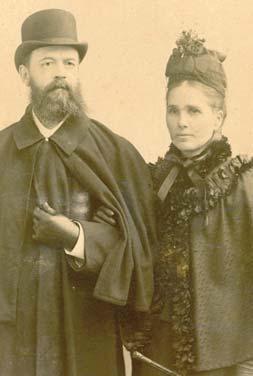
an hour while the people listened in rapt silence. Then, seeing a dusty Russian worker nearby, Friesen pulled him up and, in full view of the crowd, kissed him on both cheeks in true Russian style.
“And now we will all go home or to our work,” Friesen called out. The people obeyed as if under command by the authorities. According to reports, Jews were no longer molested in Sevastopol. Many times in his life, Friesen interceded on behalf of the weak. In this instance, as in others, his advocacy for the oppressed captured the essence of the gospel.
Abe Dueck, director of the Centre for MB Studies (1991-2003) and MB Bible College faculty member (1971-1991), wrote this Profiles in Mennonite Faith, reprinted with permission.
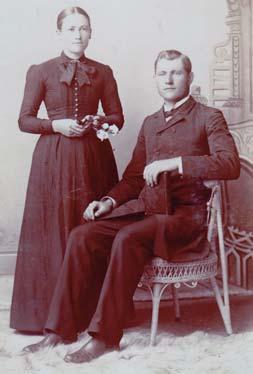
“If we do not come back, if we die, then from this group there will have to be others who will follow,” Heinrich Enns said. “We have to go; we don’t have to come back.”
With these words, Heinrich and his bride, Maria Ewert Enns, boarded a train leaving Mountain Lake, Minn., on the first step of their journey to the Cameroons. It was 1896, and they were the first MB missionaries from North America to serve in Africa, though they went with German Baptists as there was no MB mission agency at the time.
Heinrich first felt called to serve as a missionary at age 16. To prepare, he attended Mountain Lake German Bible School and then the Baptist seminary in
Rochester, N.Y. During occasional visits to Minnesota, he conducted revival meetings in his home church, Bingham Lake MB Church (later Carson MB Church).
Fourteen-year-old CN Hiebert, who became a prominent MB evangelist, was among those who committed their lives to Christ during these services.
At 18, Maria Ewert confessed her faith and was baptized at the Bingham Lake church, which her parents helped to found. Longing to share God’s love, she trained as a nurse and took missiology courses in Germany. A shared vision to serve as missionaries brought Heinrich and Maria together.
They were married Aug.2,1896, during the Sunday morning service and were immediately ordained into ministry. The congregation shared a meal and then reconvened for the Enns’ farewell service. In Heinrich’s journal he describes feeling “torn apart” as they “waved handkerchiefs and hats” in their final goodbye three months later.
Enns updated the church regularly. In May 10, 1897, he wrote: “We here in the mission house are all very well. To the Lord many times thanks for that. We must ascribe our good health to the many prayers of the children of God that rise to the throne of grace for us. Your co-pilgrim to the Heavenly Home.”
Six weeks later, Heinrich died of “black” fever. Before the end of the year, Maria also died, as did their newborn baby. Heinrich was 29; Maria, 26. Heinrich and Maria felt God’s call on their lives, only to lose their lives. However, this started a steady stream of missionaries sent from the Bingham Lake/Mountain Lake congregation. This joint group of mostly farmers had a strong vision for missions and ministry. They discerned the gifts of young people in the congregation, tapped them on the shoulder, provided opportunities for them to develop their leadership skills and encouraged them to serve. The church “prayed out” and supported these young people who became missionaries, pastors and Mennonite Central Committee workers.
Aaron A. Janzen was only 14 when he heard Enns’ words at the train station. He couldn’t get them out of his mind and finally yielded his life to Christ. He and his wife, Ernestina, subsequently followed God’s call to become the first MB missionaries in Congo. Today, the Congo conference is the second largest in the global MB church.
Elaine Ewert Kroeker is an educator and author.
John B. Toews (Sept. 24, 1906–May 9, 1998) was one of the most influential Mennonite Brethren church leaders of the 20th century. His influence spanned 60 years of ministry as pastor, teacher, college and seminary administrator, mission executive, theologian and historian for Mennonite Brethren around the world.
“JB,” as he was popularly known, is perhaps most remembered for his inspiring, motivational speaking about missions, theology and history. Fluent in Dutch, German, Russian and English, Toews was articulate and well read on the latest trends in missions and historical theology. He influenced thousands of people to follow Jesus in church and missions.
Born to Johann A. and Margaretha (Janz) Toews in Ukraine, Toews graduated from the University of Ukraine in 1926, studied in the Netherlands and then immigrated to Alberta, Canada, in 1928. He studied at Tabor College in Hillsboro, Kan., Western Baptist Theological Seminary and Southern Baptist Theological Seminary. In 1933, he married Nettie Unruh. They had three sons.
Toews taught New Testament theology and doctrine at Bethany Bible School in Saskatchewan, and later served as president. He was director of the Bible department at Freeman College, Freeman, S.D., president of MB Bible College in Winnipeg, and president of the MB Biblical Seminary in Fresno, Calif., followed by several years as adjunct professor of missions, practical theology and history at the seminary. He pastored MB churches in Hepburn, Sask., Buhler, Kan., and Reedley, Calif.
Toews rose to international prominence as a leader and inspiring speaker during his 10-year term as general secretary of the MB Board of Foreign Missions. His travels on behalf of the board established him as a missionary statesman among all Mennonites.
Toews helped shape the MB church and its agencies, often at the cutting edge within the institutions he served. He guided the seminary to an Anabaptist approach in its interpretation of Scripture and was instrumental in bringing in new faculty to teach and re-invigorate the leadership of the MB church.
Toews moved MB missions from a paternalistic worldview into a new era of international indigenization. Missionaries and long-time mission supporters were slow to understand the changed thinking, growth, vigor and restlessness of new MB adherents in other countries. It was hard for the North American church and its missionaries to understand that the people they had brought to
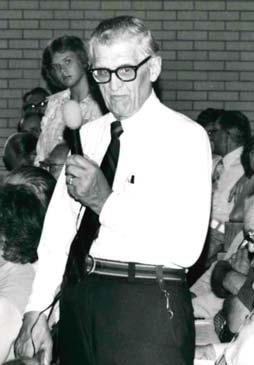
faith were now ready to take over the leadership of their national churches.
Having taught history and theology until his retirement in 1980, Toews remained active within the MB church, its agencies and institutions by encouraging Mennonite Brethren to remember their theological and historical roots within the broader Anabaptist vision. He served as the first director of the Center for MB Studies in Fresno, Calif., and he pushed to establish similar centers in Hillsboro, Kan., and Winnipeg, Man. His vision gave rise to the MB Historical Commission, of which he became the first executive secretary.
Ken Reddig is a longtime archivist and historian for the Manitoba government and two Mennonite archives. Profiles in Mennonite Faith, reprinted with permission.
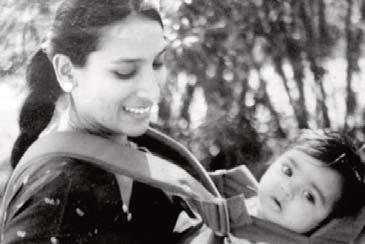
Karuna Shree (Feb. 8, 1964—July 7, 1996) was born to Mennonite Brethren high school teachers S.S. Krupiah and B.D. Kanthamma on the MB Mission compound in Wanaparthy, India.
During Karuna’s pre-theology studies at MB Bible School in Shamshabad, God called her to full-time ministry, and she committed herself into God’s hands. By 1984, Karuna had completed a Bachelor of Theology from South India Biblical Seminary in Bangalore.
When she was 21, Karuna Shree married P. Menno Joel, her teacher in Shamshabad. This arranged marriage, the common practice in India, was made by her parents without her knowledge. Though initially cautious, Karuna agreed and Menno encouraged and actively supported her pursuit of theological studies. They had a son and two daughters.
Karuna recognized how discrimination toward women within Indian culture also happened within the church, where women’s gifts and participation in ministry were rarely encouraged. Convinced of the unused potential, she pursued theological training, concluding that Jesus did not regard women as inferior.
Karuna completed a Bachelor of Divinity from Andhra Christian Theological College in Hyderabad and became the first MB woman to earn a Master of Theological Studies, which she completed at United Theological College in Bangalore. She specialized in homiletics, which proved challenging given that preaching by women was not accepted in MB churches.
Karuna promoted the ministry of women with gentle urgency, knowing full well the obstacles within her society and church. She sought to help women understand the biblical teaching about women and encourage them to explore their gifts.
Karuna shared her testimony at the 1990 Mennonite World Conference in Winnipeg. She was the first Mennonite Brethren woman to represent India at the ecumenical Christian Conference of Asia.
Shattering barriers that had limited women’s involvement within the India MB Conference, Karuna served as a member of the Conference’s Governing Council, as editor of the monthly magazine and as an instructor in homiletics and pastoral ministries at MB Centenary Bible College in Shamshabad. She also served as the executive secretary of the Mennonite Brethren Women’s Conference.
Karuna and Menno traveled extensively on behalf of the conference, leading retreats and seminars. Her love and acceptance toward all endeared her to local villagers and conference leaders.
A conflict between two rival groups over leadership of the MB conference also affected women’s ministries. At a gathering of women from both factions, Karuna advocated for a single unified leadership body. When the women voted overwhelmingly to unite, she voluntarily stepped down as secretary to make space for the election of new leaders. Her humility prompted someone from the rival group to declare that Karuna had given good leadership and should continue in her role.
At age 32, Karuna Shree was killed in a vehicle accident along with her 8-month-old daughter, Sneha. With less than a day’s notice, more than 2,000 people attended her funeral.
Shortly before her death, Karuna reflected on her ministry, “Above all, God’s continuous grace sustains me to bear everything and anything. I am a small vessel in his mighty hands.”
Doug Heidebrecht is director of global training and associate professor of mission and theology at MB Seminary. Profiles in Mennonite Faith, reprinted with permission.
Knowing Jesus brings freedom
Myname is Cesar E. Chavez. I am 53 years old and live in Mission, Texas, with my wife, Mary.
I thank God for the change he made in my life because now I am a new man. My previous sins involved entertainment, bars and alcohol.
I started drinking at the age of 15, and I got four Driving While Intoxicated violations. In the state of Texas, three or more DWI offenses is a third-degree felony, with a minimum sentence of two years in prison. I went to prison in 2014 and was released in 2017.
In prison, I started reading the Bible. I had never read the Bible, but I began to like it. I liked to read the stories, like in Genesis when Joseph suffered greatly but remained faithful to God. God had a plan for him. I didn't understand it, but God was beginning to work in me.
Each cell held two prisoners. Our room was illuminated, and the windows sweated with the air conditioning. I always wrote the name of Jesus on the glass. One night, the letters on the glass looked different, appearing larger and outlined in bold.
My companion did not see or feel anything because he did not have
communion with God. But from that day on, my life began to light up, and I fell more and more in love with Jesus Christ. When I got out of prison, I was baptized.
My mother attends Mission MB Church, and she always asked for prayer for me during my years in prison. When I got out of prison, I went to thank the church for praying for me. Thank God, I stayed there, and now it is my church, too.
Many of our family members attend the same church. I like the family atmosphere and fellowship at church. The church is like my family.
I've been out of prison for six years and now have a clean life in Christ Jesus. I participated in the TUMI study for four years. Among the many things I learned from the TUMI program is a deeper understanding of the Word of God.
I learned to be willing to serve God and to serve my church. I go with my pastor to people who need prayer or who need to hear the Word of God. I always like to participate in my church, and I have earned several recognitions.
God has shown me a lot of mercy, and I have much more I could say about how Christ has changed me. Many blessings to all who read my story. Amen.
The LAMB Conference partners with TUMI, The Urban Ministry Institute, an arm of World Impact. TUMI offers affordable theological education in an urban context for those who have not been traditionally educated and who do not live near a seminary.
…from that day on, my life began to light up, and I fell more and more in love with Jesus Christ.

Cesar E. Chavez attends Mission MB Church in Mission, Texas. He and his wife, Mary, have one daughter and one grandson. He enjoys serving God and serving his church.
Spanish version posted online.
Thetalk of the town in recent months here in Saratoga Springs has been the completion of the LDS (Mormon or Latter-day Saints) temple. Since former LDS President Thomas S. Monson announced in 2017 that a temple would be built in Saratoga Springs, Utah, there have been mixed responses from our friends and neighbors. Because nearly 90 percent of the Utah County population considers themselves LDS, the most noticeable emotions were excitement and anticipation. However, for the growing number of people who have left the LDS faith, we noticed ill feelings of frustration or annoyance. Somewhere in the middle was a sense of curiosity among those new to the area.
While temples are normally only accessible to worthy LDS members, there is a three-month period when the general public can tour a temple before it's officially dedicated. Much to our surprise, our church staff received a VIP invitation from the mayor to tour the temple with city officials and business owners—a perk of being the only non-LDS "clergy" in town. One of our good friends was in charge of organizing 38,000 members to be ushers and tour guides during this period, and he was thrilled to walk with us
through the temple. This made our experience full of fun and meaningful dialogue.
So, what was it like? On one hand, it's a beautiful building filled with people who are genuinely kind, well-meaning and devoted to their faith. On the other hand, the tour clearly revealed many of the religious steps one has to climb to achieve “exaltation.”
The LDS understanding of exaltation is eternal progression to the highest degree of glory, the celestial kingdom. Church founder and prophet Joseph Smith described it this way: “When you climb up a ladder, you must begin at the bottom, and ascend step by step, until you arrive at the top; and so it is with the principles of the gospel—you must begin with the first and go on until you learn all the principles of exaltation.”
Only by “climbing this ladder” do Mormons experience Heavenly Father’s presence, receive godhood and live with their earthly family forever. These “steps” include temple recommend cards to prove worthiness, white garments to signify purity, ordinances, endowments, proxy baptisms for the dead, marriage sealings, proxy marriage sealings, veiled handshakes to enter the celestial room (most holy place) and more.
As the laws and ordinances begin to stack up, the big question that emerges for me is: Didn’t Jesus come to free us from the law? Paul reminds us in Galatians 5:1, “So Christ has truly set us free. Now make sure that you stay free, and don't get tied up again in slavery to the law” (NLT). Paul continues in
verse four, “For if you are trying to make yourselves right with God by keeping the law, you have been cut off from Christ. You have fallen away from God’s grace.”
We mourn the reality that LDS doctrine proclaims Christ as Savior yet functionally places heavy burdens on people to attain exaltation through morality, good works and obedience to church ordinances. Doesn’t this tie people in slavery to the law?
Yet, Jesus is doing a great work in Utah! By God’s grace, many are discovering that true freedom comes through relationship rather than religion. We continue to pray the words of Jesus from John 8:36, “So if the Son sets you free, you are truly free” (NLT). Thank you, Jesus, for offering us this freedom.

Drew Pankratz is associate/youth pastor at Greenhouse Community Church in Saratoga Springs, Utah.
Church is more than a social club got questions
Ourchurch communities are asking many questions. One question catches my attention, not just because of its importance but because it is primarily pondered by people we assume already have an answer. It’s those of us sitting in the pews on Sunday morning who are most eager to know: “What is church and what is it for?”
The Merriam-Webster dictionary defines church as “a building for public and especially Christian worship” or an “organization of religious believers.” While this is technically true, most church attendees do not describe “church” as merely a physical building and strive to be more than just another recognized institution in a neighborhood. A Google search can pinpoint a church building on a map, but it can’t describe its purpose within a community.
In his book, The Call, Os Guinness describes the church as “the called-out assembly of God’s people, which is subordinated to Christ as its head and coordinated with its fellow members of the body, lives its life by practical obedience to God’s call in Christ.” Put more simply, Guinness sees the church (both global and local) as a group of people following God together.
The book of Acts tells us that the early followers of Jesus responded to their calling and “devoted themselves to the apostles’ teaching and to fellowship, to the breaking of bread and to prayer” (Acts 2:42). The growing church was for worshipping God and en-
couraging each other. Those of us in modern church communities are asking: Is that still what church is for?
I spoke with a few people who are invested in different church communities about how they are navigating these conversations. Even though they live out their purpose in diverse ways, they are committed to the same call of following Jesus. Some long-standing church members agree that music, fellowship and Bible study are important aspects of church life, but those activities are not what define a church. If our aim is only fellowship, church becomes a social club. If our goal is simply to sing together, church becomes a concert. Everyone agreed church is more meaningful than that.
Pastor Nathan Ensz of Kingwood Bible Church, Salem, Ore., believes that church is a place for people who have “placed their faith in Jesus…actively equipping and encouraging them as they follow Jesus.” However, Ensz understands the calling of our “global family” also needs to be outward-focused. He says, “Churches that equip their believers help them discover their purpose far exceeds isolation with other ‘called out ones’ and teaches them to intentionally extend the call of following Jesus to others.
Writing in prose poetry, Ensz says, “The church is believers… Who thrive when encouraged and equipped…
standing column
To make a difference in the life of those who don’t yet know Jesus.”
In my local congregation, Cornerstone Community Church, Topeka, Kan., Pastor Kayla Traver views church as a “microcosm of God’s kingdom life…a place where we practice God’s love in the here and now, getting a foretaste of what heaven will be like.” Traver views the church as both the present and the future, a place where people are invited to “come and see” what God is up to.
In this season of local church events and global holiday celebrations, continue to ask this question: What is church and what it is for? My hope is you will discover meaning and purpose as you gather.

Caitlin Friesen, a graduate of Fresno Pacific Biblical Seminary, is married to Ben Friesen and is part of Cornerstone Community Church in Topeka, Kan.
In the Kliewer family, three sisters and one sister-in-law all work in MB church offices
“Whenthe Kliewers get together, it is not just a simple family gathering; it’s a huge party,” sister-inlaw Renee Kliewer says. “Activities, treasure hunts, volleyball games.…”
“For a full week,” Shelly Loewen interjects as her sister Rhonda Gossett chimes in with more activities: “Fireworks, picnics.…”
Renee continues: “(Nancy) sends out a list of all the activities. She figures out the menus and what we're all supposed to bring.”
“Nancy’s our party planner,” Shelly says, smiling, while Rhonda adds: “There are benefits to having a secretary in the family.”
But the Kliewers don’t have just one secretary in the family; they have four. Nancy Fast works at Pine Acres Church in Weatherford, Okla., Shelly Loewen at Parkview MB Church in Hillsboro, Kan., Rhonda Gossett at Bethany Church in Fresno, Calif., and sister-in-law Renee Kliewer at Corn (Okla.) MB Church (CMBC).
The sisters attribute their commitment to church to their parents’ example.
“Their example of faithfulness is what has been the big influence,” Rhonda says.
Roy and Maralea Kliewer raised their five children—Nancy, Gary, Mike, Shelly and Rhonda—on the family farm west of Corn. Renee grew up two miles west and admits to having her eye on her now-husband, Mike, long before he was interested in her.
Known as easygoing and humble, Roy was a farmer, growing wheat and raising cattle. Maralea, who
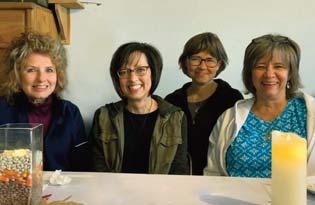
still lives on the farm, was cafeteria manager at Corn Bible Academy, where Roy served on the school board.
The family was active at CMBC. Roy was a deacon, and Maralea was Sunday school superintendent and participated in the sewing circle. Both sang in the choir and helped with Wednesday night meals.
The sisters laugh as they remember turning off the television before their favorite shows ended on Sunday and Wednesday nights to get to church on time.
The Kliewers had family devotions. Each morning, Roy read from Our Daily Bread. Every night, Maralea read a Bible story.
“The Bible (and) church were very much a part of our lives always,” Nancy says. “We were in church every time the doors were open.”
All four women graduated from
Corn Bible Academy. The sisters attended Tabor College in Hillsboro, Kan., and did Christian Service, a program in which one worked for an MB institution in exchange for paid expenses and a stipend. Each met their husband because of it— Nancy at Tabor in Hillsboro, where she met her husband, Steve; Shelly at Fresno Pacific University, where she met a seminary student, Wendell; and Rhonda at MB Biblical Seminary and the Pacific District Conference, having met her husband, John, while visiting Shelly. “It was all mutually beneficial for Christian Service,” Rhonda says with a laugh.
The four women, with a combined nearly 70 years of secretarial experience, have witnessed changes in technology and attitudes toward church.
Nancy will have served at Pine Acres Church for 30 years come April. She is both office manager and financial secretary, and her job has grown from 15 hours a week to full time.
“Our church family is wonderful,” she says. “I love being here to help them in any way I can.”
When Nancy began, she worked on a selectric typewriter.
“I did a lot of cutting and pasting, and I had to collate all reports myself,” she says. “I don't miss those days. Texts and emails have also taken the place of sending things through the postal service.”
Shelly has served 18 years as office manager at Parkview MB Church, working three days a week.
“I love interacting with the people,” she says. “It brings me a lot of joy to assist them in their ministries at church as well as visit with and encourage them as they come into the office.”
She learned shorthand in college and took timed typing tests on typewriters.
“When we prepared newsletters, there was a lot of cutting and pasting, and when it was done, paper copies went in the mailboxes,” she says. “Email, texting (and) Google Docs have all made communicating with the congregation so much easier.”
Rhonda has served as part-time bookkeeper at Bethany Church for more than 16 years.
“I like the routine,” she says. “I enjoy being able to put numbers in the right places so leadership can see what is going on financially and then make the right decisions for the church.”
Technology has made her job easier, she says, though constant changes provide challenges, a sentiment shared by Renee.
“I don’t know how I could do my job without email and texting,” Rhonda says. “Accounting software is so easy
compared to pencils and paper ledgers.”
Since 2017, Renee has served as secretary at CMBC, where Nancy and Shelly have also worked.
“I told Mike when I was asked about being secretary, ‘I guess I can join your sisters,’" she says. “The people have been great.”
Thanks to faithful parents
Turns out, having four secretaries in the family is helpful.
“Sometimes when we're together, we'll say, ‘What do you do in this situation?’ or ‘How do you handle newsletters?’” Shelly says.
The women have noted changes in attitudes toward church, with Nancy and Renee lamenting that church attendance is not the priority it once was and Shelly wondering if the pandemic and online streaming has affected attendance. Rhonda notes trends of increased donor generosity but also increased church spending.
Though attitudes have changed, the Kliewer sisters remain faithful.
“I think we can attribute a lot of our commitment to church to the faithfulness of our parents,” Rhonda says. “Maybe it's a tribute to our parents— what we are currently doing and our desire to serve.” —Janae Rempel



































Okeene family thankful for heritage of faith and farming
Afloursack quilt hangs in the sanctuary of Okeene (Okla.)
MB Church (OMBC). The handmade relic from the 1950s was discovered by a church member last spring in the now-unused choir loft. As members examined the women’s embroidered names on the quilt squares, they discovered a common thread—a family whose church membership spans more than 100 years.
After Jayce Schultz was baptized and joined OMBC last May, the congregation presented her with a plaque recognizing six generations of her family to join OMBC, a testament to the family’s longevity in farming and faithfulness.
Jayce’s parents, Loni and Brandon Schultz, are fifth generation farmers with about 1,600 acres of farming ground, 2,000 acres of grass and a cow/calf operation. Brandon serves as an OMBC deacon and Loni as church treasurer.
“Our values are simple—God first before anything,” Loni says. “We lean on him in the good and bad. He has pulled us from the ashes and walked us through the most beautiful sunsets (and) sunrises. We see him in the fields as we are checking cattle, running tractor or looking out the kitchen window. I hope and pray we are setting a good example for our kids.”
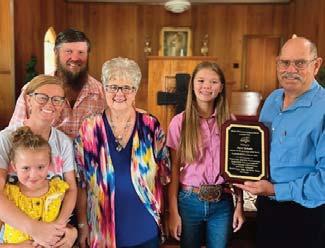
Jayce was baptized in the same stock tank in which her mother was baptized eight years prior.
“The cows need the water and that's our livelihood,” Loni says. “We were bringing it all back in a full circle of God gracing us with our livelihood.”
An eighth-grade honor roll student, Jayce serves as class president and is active in sports, Future Farmers of America, 4-H and Fellowship of Christian Athletes. While she enjoys showing cattle and intends to farm and ranch, Jayce also carries the family legacy of faith as an active member of OMBC, where she helps collect the offering and prepares and presents Bible lessons when it’s OMBC’s turn to hold services at the local nursing home.
“I wanted to get baptized because I am in a household where Jesus has come first,” Jayce says. “I am blessed to be a part of our church family. I enjoy getting to do activities and being a member so much. I am also blessed to be able to volunteer for our church and preach at the nursing home here in Okeene.”
The family’s church membership can be tracd to Jayce’s paternal grandmother’s side. Brandon’s mother, Jana, joined OMBC at age 10. A retired teacher, Jana taught Sunday school, sang in the choir and served as secretary of the Christian Young People’s Society programs. Her husband, Ted, was a trustee. Attendance has dwindled, Jana says, from 80 members when she was younger to 23 as members age and fewer young people attend.
“It's still a wonderful church and deep faith-rooted,” she says. “We try to welcome (and) invite people.”
Jana’s parents, Arlo and Marlyss Patzkowsky, are remembered as faithful members of OMBC. Arlo served as church treasurer, on the church council and also narrated Christmas programs.
“They raised my brother and I to go to church and find the importance in learning to know that the Lord needed to be our savior,” Jana says. “They didn't pressure us. We enjoyed going to church.”
When OMBC’s current brick building was constructed in 1927, Marlyss’ parents, John and Martha Neufeld, supplied sand from their farm for cement. The Neufelds served as elders and deacons at OMBC. John was moderator and is said to have loved playing his harmonica in church. Martha planned church dinners.
“He had his certain spot that he sat in every Sunday, and he was very patient and kind,” Jana says of her grandfather. “After I got saved, I had some doubts, and he talked to me about it and said you have to have peace with God and even though you can't see, you have to believe.”
Martha’s parents, Alexander and Margaret Wahl, were the first generation to join OMBC. They married in 1883, had nine children and lived in Hillsboro, Kan., and Fairview, Okla., before moving to Okeene around 1921.
Thirty years prior, OMBC members first gathered in 1892, building a small, cedar building, and later, a new structure in 1901. OMBC received its charter in 1903, four years before Oklahoma became a state.
Today, the church offers adult Sunday school classes and a livestream. Each year, the congregation packs
Operation Christmas Child shoeboxes—they filled 66 last year.
“It's comfortable,” Loni says of OMBC. “You don't feel tense walking into (church). You don't feel like you have to pretend and fake smile. It's like a family, and it's changed my life.”
Pastor Bennet Peters has led the congregation for 42 years, the longest-serving USMB pastor at one church. Peters has known four generations of the Schultz family. He has welcomed Ted Schultz as a church member and baptized Brandon, Loni and Jayce.
“The Neufeld, Patzkowsky and
Schultz families modeled their faith and church attendance,” Peters says. “They not only encouraged their own families to go to church but other people as well.”
For the Schultz’s, OMBC is part of their story marked by farming, family and faith.
“Our church is part of our family,” Loni says. “We are small, but we are mighty. We attend our church, whether we had to catch cattle in the morning and we are kicking our boots at the door or my younges forgot to brush her hair. They love us no matter how we come.”—Janae Rempel















Themission of Reedley MB Church includes “proclaiming God’s gospel to all.” For volunteers and leaders involved with the church’s JOY Disability Ministry, that mission begins right within the church walls.
“We usually think of people around the globe,” says Christa Scott, JOY Ministry coordinator. “But [missions] is also children, adults and families who deal with disabilities.”
The Reedley, Calif., church has had a disability ministry for years under various names. When Scott took on the role of coordinator in 2020, she changed the name to JOY Disability Ministry; the acronym JOY stands for “Jesus, Others, You.”
Scott attended an event in 2019 put on by Joni and Friends, an international disability ministry that provides training for churches that have or wish to begin disability ministries for their congregations.
“As the day went on, I definitely could feel the call of God on my life, that this was something I was resonating with,” Scott says.
Scott stepped into the position in March 2020, just before the COVID19 shutdowns began. She said the following months gave her time to expand the vision of how the ministry could serve children and adults both in and outside of the church.
Removing and adapting
“It’s so often difficult for families to become a part of the church because there are so many barriers for them to participate,” Scott says. “If we can help remove those barriers and accommodate and adapt our service to what they need to participate, then that can allow them to

have a home at a church and be encouraged and use their gifts to serve, which is what the body of Christ is supposed to do.”
The ministry now includes four facets. The first is the buddy program, which assigns one-on-one volunteers to children and youth with disabilities so they can participate in Sunday school or Wednesday night activities with their own age group.
The ministry also provides a Sunday school class for adults with disabilities and a mentor program that extends beyond the church walls.
“(The program) is for adults who do not attend as regularly, but we have people who are regularly reaching out to them and being their friend, taking them on outings (and) giving them spiritual encouragement,” Scott says. “That has been a
blessing to see people feel the love of Christ even though they’re not able or comfortable to attend.”
Scott says the ministry conducts inperson training for volunteers in these programs each January, with help from a church liaison from Joni and Friends. She also attends monthly network meetings held by the organization.
“I go as often as I can and meet with other ministry leaders from churches in the greater Fresno area,” Scott says. “We try to learn from each other.”
The final facet of the ministry is providing respite events that allow parents and caretakers of people with disabilities to have several hours of free time for rest or whatever else they need to do. One such event was held Sept. 16 for four hours, serving seven families.
The events are held at the church but are open to families outside of the congregation as well.
“We’ve enjoyed getting to serve other people in the larger community that don’t have a place to have respite,” Scott says.
The events begin with about an hour of training for volunteers before families arrive. The volunteers range in age from late elementary school to those in their seventies.
“The neat thing is we have people with disabilities serving along with us as volunteers,” Scott says. “I tell them, ‘The biggest thing we need is the love of Christ. We’re not going to understand perfectly the situation of each person, but if we have his love and if we’re listening and learning from them what they need, we have all we need.’ We’re all just there together as one family.”
At the September event, Scott included a devotional time and read the Parable of the Great Banquet from Luke 14.
“We want our church to become a welcoming place for people with disabilities,” Scott says. “We are giving the glory to God and giving people the value they deserve because they’re made in the image of God.”
Volunteers provide lunch and a wide variety of activities, including crafts, games, puzzles and movies, as well as time on the church’s playground and basketball court.
“It’s a very joyful event for sure,” says Scott.
In October, the ministry organized

a potluck-style fall party for families and volunteers to fellowship and get to know one another. They also plan to hold another longer respite event in November to allow caregivers a chance to do their Christmas shopping.
Scott emphasizes that the JOY Ministry is truly a team effort that relies on volunteers, the six-member leadership team and the support of church leadership.
“God has been so good in providing the volunteers that we need,” Scott says. “It’s so obvious that he cares very much about each of our friends affected by disability.” —Jessica Vix Allen
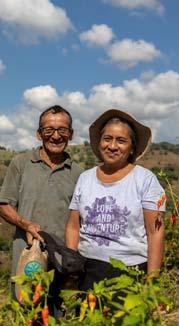

Tocel To ate o celebr cel Jesus’ bir plore gifts that ex sustain families and bring comfor or the w f th, t and joy orld. mcc.org/christmas-giv 888.563.46 mcc.org/christmas-give
God opens door to location “not on our radar”
Thebad news: Christ Community Church in Sioux Falls, S.D., needed to find a new meeting location when the church’s landlord chose not to renew its lease. The good news: Pastor Jeff Turner says the location change creates new opportunities for ministry.
“I’m not one who thinks that location solves all the problems,” Turner says. “But we were very constricted in our old location, and it was only going to get worse. The city closed off access from a main road to the road that leads to our church. It was increasingly difficult to find the church.”
Drug use and increased crime was also prevalent in the neighborhood, he says.
In July, the church moved to its new location—about 3 miles south of Sioux Falls, 5 miles west of Harrisburg and 5 miles east of Tea.
“Being surrounded by the communities as we are now opens up a lot of opportunities for us,” Turner says. “Our goal is to gain an understanding of what some of the needs are in those areas and how we can help address them. There is an elementary school about one and a half miles north of the church. We are looking at how we can minister there as well.”
CCC shares a building with a nondenominational church, NewDay Church. CCC has moved its Sundaymorning service from 10 a.m. to 11 a.m. to accommodate the NewDay congregation’s 9:30 a.m. service.
CCC is contributing its sanctuary chairs for both congregations to use.
“They have been so welcoming and supportive of us being there,” Turner says. “There is plenty of outdoor space for all kinds of activities.
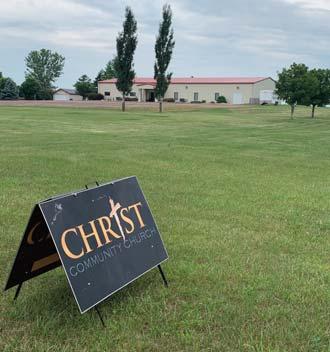
There's even a fire pit to have a small bonfire. We are working on sound and lighting and getting the livestream up and running.”
The new location also has a kitchen, something CCC did not have in its old location.
Turner says the congregation has considered moving for the past two years, but rent and land expenses
were prohibitive.
“We wanted to move the church to northwest Sioux Falls where there are very few churches, but it was way too expensive even though it seemed good to us,” he says. “God has opened the door in a place that was not on our radar at all.”—Janae Rempel
Don’t underestimate the value of encouraging young people
Aswe in the USMB family find ourselves in need of more vocational ministry leaders, including pastors, worship leaders, missionaries, teachers and youth leaders, it’s important to remember the “art” of shoulder-tapping.
Shoulder-tapping is simply going directly to a person and encouraging them about their ministry giftedness. It could be to encourage them to participate along with you in a particular ministry in the church or it could be affirming them about vocational ministry.
A large percent of those currently involved in full-time ministry point back to a moment when someone affirmed them, encouraging them to think about using their God-given gifts for Kingdom work.
“When I was in my late twenties, I was given an opportunity to preach during an evening worship service at the MB church in Ulysses, Kan., where we attended,” says Don Morris, USMB national director. “After I preached, one of the elders said from the stage, ‘Don, you should go preach!’ I remember feeling something deep inside when he said that as I had never considered leaving our family farm. That moment began a four-year season of wrestling with God, feeling the call to ministry and ultimately leaving, along with my wife and three children, for pastoral training in Fresno. That ‘shoulder-tapping’ had an enormous effect on my life.”
Have we lost the art of shouldertapping? Do we encourage young leaders to pursue ministry? Do we affirm gifts as they become evident in a person’s life—perhaps long before those gifts are nurtured, seasoned and ready for the rigors of pastoring or missionary work? Are we willing to pull a young man or
woman aside and say, “I see something in you. Have you ever considered…?”
Maybe it begins with asking someone about a role in the local church. If we depend on announcements from the stage or bulletin to
vocational ministry leaders. The average age of pastors is rising every year, indicating that young pastors are not emerging at the level needed to replace those who are retiring. Although there are many things that should be done to help
Have we lost the art of shoulder-tapping? Do we encourage young leaders to pursue ministry? Do we affirm gifts as they become evident in a person’s life— perhaps long before those gifts are nurtured, seasoned and ready for the rigors of pastoring or missionary work?
fill positions in the church, we’ll likely struggle to find enough people. People don’t want to be recruited, and very few people will respond to that kind of appeal. Vanderbloemen, a Christian leadership organization, writes in a recent article, “Most (people) jump in and help because they want to make a difference with their lives or because they want to meet some people and crave community. That’s why you must talk about shouldertapping. ‘Join me.’ This tells me that someone wants to be with me, that I have worth, and that I can make a difference.”
It's widely known in church circles these days that almost all denominations are grappling with the problem of not having enough
alleviate this deficit, shoulder-tapping must be part of the solution. In this day and age, most potential full-time ministry leaders will not leave their current locations to “go to” seminary or Bible college. Much training is done online. We need more such offerings and to make them known to our churches so that those who are shoulder-tapping can direct a potential leader to these resources. Taking just one class online can whet the appetite so to speak. As you read this, is someone you know coming to mind? Are you thinking that perhaps you should speak to them and affirm them for ministry—tapping their shoulder? If you do, it just might be one of the most momentous experiences in that person’s life.—USMB
Baptism/Memberships
Justin Pretzer and Victoria Pretzer were baptized Oct. 1 at Bethany Church, Fresno, Calif. Four people were baptized Aug. 6.
Gabe Stansfield was baptized and received as a member of Bethesda Church, Huron, S.D. Sept. 10.
Stephanie Wolcott, Aubrey Durheim and Waylon Winters were baptized Sept. 17 at Butterfield (Minn.) Community Bible Church.
Lola Hoehne, Ella Hoehne and Nikki Smith were baptized at Lake Region Mennonite Church, Detroit Lakes, Minn., Sept. 3.
Tim and Jill Schellenberg were received as members at North Fresno (Calif.) MB Church, Sept. 3.
Five people were baptized Aug. 27 at Greenhouse Community Church, Saratoga Springs, Utah.
Tyler Kliewer and Willow Manney were baptized Aug. 6 at Pine Acres Church, Weatherford, Okla.
One person was baptized at Lighthouse Community Church, Wichita, Kan.
Eva Betz, Kyle Burkholder, Elena Greenleaf, Karci Kimzey, Keeli Kimzey, Adaighzion Prediger, Chloe Robben, Emily Ross and Tyler Schaeffer were baptized at North Oak Community Church, Hays, Kan., Aug. 27.
Eric Fadenrecht was baptized and received as a member at Corn (Okla.) MB Church, Aug. 27.
Compiled by Janae Rempel
Raquel Nelson, Ethan Nelson and Emma Cardona were received as members at Bethesda Church, Huron, S.D., Aug. 27.
Yi Zhang was baptized and received as a member at Shafter (Calif.) MB Church, Aug. 20.
Elliott McCann was baptized Aug. 20 at Faith Bible Church, Omaha, Neb.
Teegan Werth and Zaylee Werth were baptized Aug. 20 at Parkview MB Church, Hillsboro, Kan.
Jeff Platz was baptized at Lakeview Church, Grantsville (Utah) Campus Aug. 13. Kristi Smith and Erin McMillan were baptized Aug. 12.
Grace Shirley was baptized at South Mountain Community Church, St. George (Utah) Campus Aug. 13. Tyler Dalton, Micha Lewis and Noah Lewis were baptized July 30.
Wesley Swann and Bethany Swann were baptized Aug. 6 at CommunityBible Church, Olathe, Kan.
Susan Hopkins concluded her service as church office secretary at Salem MB Church, Freeman, S.D. Charlotte Curry began serving in that role.
Allie Pankratz concluded her service as worship pastor at Greenhouse Community Church, Saratoga Springs, Utah, and Rich Smith began serving in that role.
Kyle Young began serving as executive pastor at North Fresno (Calif.) Church Aug. 29.
John Leonard began leading Next Generation Ministries at Mountain View Church, Fresno, Calif.
J.L. Martin concluded his service Sept. 1 as pastor of children and family at Hesston (Kan.) MB Church.
Lisa Hofer began serving as office administrator at Bethesda Church, Huron, S.D.
Dickie, David “Dave” Russell, Fresno, Calif., member of North Fresno Church, May 12, 1935—Sept. 9, 2023. Parents: David J. and Ina Dickie. Spouse: Betty Jo Christian. Children: Susan George, David, Paul; eight grandchildren, six great-grandchildren.
Ediger, David D., Reedley, Calif., member of Reedley MB Church, Aug. 9, 1943—July 8, 2023. Parents: David and Edna (Klassen) Ediger. Spouse: Carol. Children: Marc, Jeremy; one grandchild.
Greene, Dolores “Dee,” Wichita, Kan., member of Ridgepoint Church, Wichita, Dec. 31, 1941—Sept. 12, 2023. Parents: Finis and Edna (Walter) Greene.
Heinrichs, Ruth Ann, Hesston, Kan., member of Hesston MB Church, Jan. 9, 1946—Aug. 20, 2023. Parents: Paul and Hilda Friesen Richert. Spouse: Dennis Heinrichs. Children: Jeff, Greg; five grandchildren.
Hofer, Darrell D., Huron, S.D., member of Bethel MB Church, Yale, S.D., July 25, 1953—Sept. 13, 2023. Parents: John J. and Josephine (Gross) Hofer. Spouse: Kathleen Mendel. Children: Tasha Schiebel, Nick, Brett, Ivan; 12 grandchildren.
Jost, Kenneth, Hillsboro, Kan., member of Hillsboro MB Church, Jan. 12, 1929—Sept. 4, 2023. Parents: John B. and Susie (Wohlgemuth) Jost. Spouse: Jean Neufeld (deceased). Children: Beverly Knust, Dallas, K.C.; eight grandchildren, six great-grandchildren.
Keckler, Tammi, Peoria, Ariz., member of Copper Hills Church, Peoria, Aug. 10, 1966—Aug. 28, 2023. Parents: Gary and Sharlene Jensen. Spouse: Bill.
Keckler, William Edward, Peoria, Ariz., member of Copper Hills Church, Peoria, April 2, 1963—Aug. 28, 2023. Parents: George E. Keckler and Constance R. Toepfer. Spouse: Tammi.
Loewen, Hulda, Hillsboro, Kan., member of Parkview MB Church, Hillsboro, Feb. 1, 1928—Sept. 23, 2023. Parents: Abraham and Elizabeth (Lizzie) Loewen.
McCorkle, Mark Russell, Wichita, Kan., member of Ridgepoint Church, Wichita, Aug. 21, 1961—July 17, 2023. Parents: Robert and Edna McCorkle. Spouse: Karen. Children: Clint, Kelsey Wilbert; five grandchildren.
McLain, Maxine Evelyn, Fairview, Okla., member of Fairview MB Church, Jan. 6, 1943—Aug. 12, 2023. Parents: Ora William and Maxine Evelyn (Hilbig) Rutledge. Spouse: G. Keith McLain. Children: Joe, Michael, Sabrina Johnson; five grandchildren.
Navarro, Joseph “Joe,” Reedley, Calif., attender of Reedley MB Church, Oct. 15, 1944—Sept. 2, 2023. Parents: Helidoro and Loretta (Aguilar) Navarro. Spouse: Estella. Children: Lisa Ebiner, Annette Madding, Brenda Sparkman; six grandchildren.
Palmquist, Glen Eugene, Huron, S.D., member of Bethel MB Church, Yale, S.D., May 14, 1961—July 25, 2023. Parents: John A. and Phyllis L. (Peterson) Palmquist. Spouse: Glenda Zeeck. Children: Drew, Callie, Cody; one grandchild.
Rempel, Marvin J., Kalona, Iowa, former member of Carson MB Church, Delft, Minn., July 5, 1941—Sept. 17, 2023. Parents: John C. and Margaret (Ewert) Rempel. Spouse: Grace Titsworth. Children: Randy, Rachel Koehn; five grandchildren.
Tagle, Ofelia Guillen, Mission, Texas, former pastor’s wife and member of Mission MB Church, Sept. 28, 1934—Sept. 6, 2023. Parents: Pilar Guillen and Concepcion Castañeda. Spouse: Alfredo Tagle, Jr. Children: Benjamin, Elizabeth Collins, Ruth Mendiola, Moises; 12 grandchildren, five great-grandchildren.
Toews, Daryl Wayne, Lustre, Mont., member of Lustre MB Church, May 24, 1949—Sept. 30, 2023. Parents: Harold and Lillian Toews. Spouse: Jean Schmidt. Children: Laurie Klippenes, Lisa Neufeld, Luanne Mullet; eight grandchildren.
Unruh, Doris Cathryn, Shafter, Calif., member of Shafter MB Church, July 19, 1928—July 16, 2023. Parents: Cornelius and Mary Eitzen. Spouse: Elmer Unruh (deceased). Children: Shirley Cartton (deceased), Darrell, Sid, Ron; seven grandchildren, 11 great-grandchildren.
Wiebe, Agnes “June,” Rapid City, S.D., member of Bible Fellowship Church, Rapid City, Sept. 9, 1930—Aug. 3, 2023. Parents: Joseph and Susie Walter. Spouse: Waldo Wiebe (deceased), Kenneth Munger (deceased). Children: Lucille Kliewer, Eileen Plett, Arlene Friesen (deceased), Judy Bryson (deceased); 11 grandchildren, 24 great-grandchildren, 13 great-great-grandchildren.
Wiebe, Audrey F., Wichita, Kan., member of Ridgepoint Church, Wichita, Nov. 8, 1932—Aug. 2, 2023. Parents: John and Mabel Fern (Cavin) Heckel. Spouse: Hubert J. Wiebe (deceased). Children: Gary, Cheryl Bangle, Randall, Paul; 14 grandchildren, 17 great-grandchildren.
Wingert, Frederick Dwight, Wichita, Kan., member of Ridgepoint Church, Wichita, Oct. 9, 1932—Aug. 9, 2023. Parents: Harold and Lois Wingert. Spouse: Kathy (deceased). Children: Teri, Bart, Daphne Adair, Wende Doyle; seven grandchildren.
Copper Hills Church, Peoria, Ariz., hosted a parenting class Sept. 28.
Community Bible Church, Olathe, Kan., held a parent forum Sept. 24 about ministry to kids and youth.
Ebenfeld MB Church, Hillsboro, Kan., held a teacher enrichment workshop and meal Sept. 24.
Neighborhood Church, Visalia, Calif., held a tax smart giving workshop Sept. 24.
The women’s ministry at Heritage Bible Church, Bakersfield, Calif., presented a “Going Beyond” simulcast featuring Priscilla Shirer Sept. 23.
SouthLife Church, Wichita, Kan., hosted a fall discipleship initiative Sept. 13.
Mountain View Church, Fresno, Calif., invited people to join a fall kick-off fast and intentionally silence technology not associated with work for one week, with corporate prayer gatherings Sept. 11-15.
Faith Bible Church, Omaha, Neb., hosted worship in the park Sept. 10.
Neighborhood Church, Visalia, Calif., had a movie night at the park Sept. 29 and a fall vibes party Sept. 24 with pumpkin spice lattes, crafts and food trucks. Moms and kids
attended a pirates and mermaid themed party Sept. 15.
Women from Corn (Okla.) MB Church had a meal and secret sister reveal Oct. 1.
Hillsboro (Kan.) MB Church men’s ministry held a Meet, Eat and Skeet event Oct. 1.
Churches held picnics and potlucks: Pine Acres Church, Weatherford, Okla., on Oct. 1; Cross Timbers Church, Edmond, Okla., Sept. 10; Salem MB Church, Bridgewater, S.D., a potluck Sept. 10; Bethel MB Church, Yale, S.D., a seventh-annual old-fashioned Sunday school picnic Sept. 10; and Discovery Church, Collinsville, Okla., women held a poolside picnic Sept. 9.
Greenhouse Church, Saratoga Springs, Utah, women went apple picking Sept. 23.
Mountain View Church, Fresno, Calif., held a Live the Mission conference Sept. 24-27 and a fall kick-off tri-tip lunch Sept. 17.
Zoar MB Church, Inman, Kan., women gathered for fellowship and faspa Sept. 17.
Community Bible Church, Olathe, Kan., women gathered for a fall brunch Oct. 14. People 55 and older enjoyed fellowship and games Sept. 15.
Buhler (Kan.) MB Church men gathered to watch Monday Night Football.
Bethany Church, Fresno, Calif., women went on a retreat Sept. 22-24.
Men from Mosaic, Littleton, Colo., went on a retreat Sept. 21-23.
SouthLife Church, Wichita, Kan., held a family game night Oct. 6.
Cornerstone Community Church, Topeka, Kan., met for chili and a hayride Oct. 7.
Good News Fellowship, Ferndale, Wash., women gathered for coffee and a walk Sept. 30 and brought monetary or diaper donations for Whatcom County Pregnancy Clinic.
The Bridge Bible Church, Bakersfield, Calif., men gathered for a fall kickoff with worship and teaching Aug. 25. Women gathered for worship, teaching and fellowship Oct. 6.
Men from Faith Bible Church, Omaha, Neb., gathered Oct. 21 for a picnic, games and worship.
Butler Church, Fresno, Calif., had a cultural celebration night Sept. 24.
Good News Fellowship, Ferndale, Wash., held praise and prayer hymn sings Oct. 8 and Sept. 10.
Pine Acres Church, Weatherford, Okla., served breakfast to the Weatherford High School football team Sept. 22.
Axiom Church, Peoria, Ariz., held a prayer night Sept. 17.
Copper Hills Church, Peoria, Ariz., held a worship night Sept. 8.a Cof Celebrations
Lincoln Glen Church, San Jose, Calif., celebrated its 80-ish anniversary with a community block party, reunion and traditions and celebration service and BBQ Sept. 15-17.
Bethesda Church, Huron, S.D., celebrated its 80th anniversary Aug. 13 with eight former pastors participating in a panel, celebration service and meal.
Ridgepoint Church, Wichita, Kan., hosted a building dedication and open house Aug. 27.
Locally
Corn (Okla.) MB Church held a clothing exchange Oct. 7.
SouthLife Church, Wichita, Kan., began a storytime for preschool-age children.
Ridgepoint Church, Wichita, Kan., is hosting a fall Good News Club at a local elementary school.
Hillsboro, Kan., churches served meals to Tabor College students: Ebenfeld MB on Oct. 1, Hillsboro MB on Sept. 10 and Parkview MB on Aug. 27.
People from Neighborhood Church, Fresno, Calif., met to pray at the local elementary school Oct. 3. The church hosted a prayer booth for people shopping during a mile-long yard sale Sept. 9.
Good News Fellowship, Ferndale, Wash., did a “Households of Faith” weekly challenge, including creating something for someone else, helping oth-



ers feel like they belong, giving up something to focus on God and creating their own games.
Greenhouse Community Church, Saratoga Springs, Utah, averaged 100 kids at its three-day summer Bible adventure. The church hosted its fifth Game Changers sports camp with help from people from Kansas and Colorado.
Kingwood Bible Church, Salem, Ore., held a car show and BBQ Sept. 9, with a bounce house and women’s potting booth.
People from Butler Church, Fresno, Calif., participated in a neighborhood clean-up day Sept. 2.
Gospel Fellowship Church, Wolf Point, Mont., hosted 87 children for a vacation Bible adventure.
An updated total raised by children at Salem MB Church, Freeman, S.D., is $1,742, enough to purchase 1,488 chickens for impoverished families.


District Minister: The Southern District Conference is seeking a district minister (DM) to begin serving in January 2024. This full-time employee serves as the conference pastor and staff executive of the SDC. The DM should have significant ministry experience and a meaningful connection to SDC churches and will especially serve as a pastor to pastors. For more information (including job description) and/or to apply, visit https://usmb.org/jobs/ or contact davefroese@gmail.com.
Lead Pastor: Koerner Heights Church in Newton, Kan., is searching for a lead pastor. Please find more information at koernerheights.org/employment or email frontdesk@koernerheights.org.
Lead Pastor: Pine Acres Church, Weatherford, Okla., is seeking a man to lead this growing congregation into the next phrase of God’s plan for our church. For more information and for application form visit https://www.pineacres.org/ job-opportunities.
Lead Pastor:Valleyview Bible Church, Cimarron, Kan., is seeking a lead pastor. To apply, visit https://valleyviewbiblechurch.wordpress.com/ pastoral-search/ or contact Charles Sauerwein at candc@ucom.net / text 620-272-6928 or Wayne Bartel at lynnbartel65@att.net / text 620-339-2243.
Worship Director: North Fresno Church, Fresno, Calif., is seeking a part-time (20 hours/week) worship director. For more information and to apply, visit https://northfresnochurch.org/jobs/. Email questions to office@northfresnochurch.org
Children’s Pastor: North Fresno Church, Fresno, Calif., is searching for a full time children’s pastor. If interested send resume to ChurchStaffing.Com, North Fresno Church, Fresno, CA. Full job description available upon request. Forward questions to: cpsearch@northfresnochurch.org.
Pastor of Student Ministries: Shafter (Calif.) MB Church is searching for a full time pastor of student ministries to oversee junior high, high school and college ministries. A full job description and additional information is available at https://www.shaftermb.org/psm/
Ministry
Director: Main Street Ministries (MSM) is seeking a director to demonstrate the love of Jesus Christ by providing physical, social/emotional, and spiritual resources in a supportive environment. MSM is a Christian non-profit organization in Hillsboro, Kan., that offers transformational housing for women and their children in times of crisis. If you are interested in this full-time salaried position, please see the full job description and fillable application on our website at: https://mainstreetministries.net/jobs/
